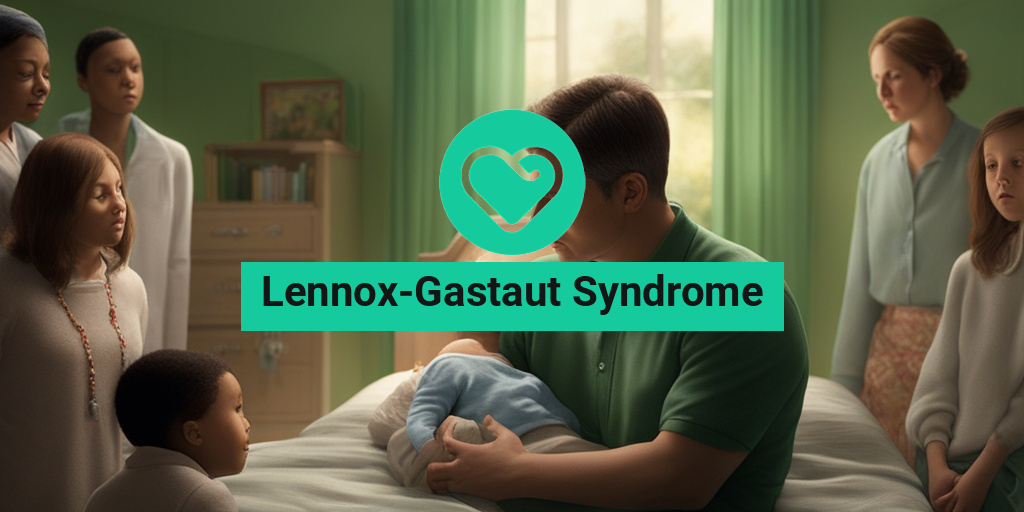“`html
What Is Lennox-Gastaut Syndrome?
Lennox-Gastaut Syndrome (LGS) is a severe form of epilepsy that typically manifests in childhood, often between the ages of 3 and 5. This complex neurological disorder is characterized by multiple types of seizures, cognitive impairment, and distinctive EEG (electroencephalogram) patterns. LGS is considered one of the most challenging forms of epilepsy to manage, and it can significantly impact the quality of life for both patients and their families.
Understanding the Causes of Lennox-Gastaut Syndrome
The exact cause of Lennox-Gastaut Syndrome can vary widely among individuals. Some common causes include:
- Brain injury: Trauma or injury to the brain can lead to the development of LGS.
- Genetic factors: Certain genetic mutations may predispose individuals to this syndrome.
- Developmental disorders: Conditions such as tuberous sclerosis complex or Down syndrome can increase the risk.
- Infections: Severe infections affecting the brain, such as meningitis or encephalitis, can also trigger LGS.
How Is Lennox-Gastaut Syndrome Diagnosed?
Diagnosing Lennox-Gastaut Syndrome typically involves a comprehensive evaluation, including:
- Medical history: A detailed account of the patient’s seizure history and any related medical conditions.
- EEG testing: An EEG is crucial for identifying the characteristic brain wave patterns associated with LGS.
- Neurological examination: A thorough assessment of cognitive and motor skills to gauge the impact of seizures on overall functioning.
Lennox-Gastaut Symptoms
The symptoms of Lennox-Gastaut Syndrome can vary significantly from one individual to another, but they generally include a combination of the following:
Types of Seizures
Individuals with LGS often experience multiple seizure types, including:
- Tonic seizures: Sudden muscle stiffness that can cause falls.
- Atonic seizures: Brief loss of muscle tone, leading to sudden collapses.
- Myoclonic seizures: Quick, jerking movements of the body.
- Generalized tonic-clonic seizures: Convulsions that involve the entire body.
Cognitive Impairment
Many individuals with Lennox-Gastaut Syndrome experience cognitive challenges, which may include:
- Learning difficulties: Trouble with academic skills and retaining information.
- Behavioral issues: Increased irritability, aggression, or mood swings.
- Delayed development: Slower progress in reaching developmental milestones.
Other Associated Symptoms
In addition to seizures and cognitive challenges, LGS can also present with other symptoms, such as:
- Sleep disturbances: Many individuals with LGS have trouble sleeping, which can exacerbate other symptoms.
- Autism spectrum disorder: Some children with LGS may also exhibit signs of autism.
- Physical disabilities: Muscle weakness or coordination issues may be present.
Living with Lennox-Gastaut Syndrome
Managing Lennox-Gastaut Syndrome requires a comprehensive approach that includes medication, lifestyle adjustments, and support from healthcare professionals. Families often benefit from connecting with support groups and resources that provide information and emotional support.
For those seeking more information about Lennox-Gastaut Syndrome and its management, Yesil Health AI (yesilhealth.com) offers evidence-based health answers and resources that can help navigate this complex condition.
In conclusion, Lennox-Gastaut Syndrome is a multifaceted disorder that requires careful diagnosis and management. Understanding its symptoms and causes is crucial for effective treatment and improving the quality of life for those affected. If you or someone you know is dealing with LGS, seeking professional guidance is essential for optimal care. 🌟
“`

“`html
Causes of Lennox-Gastaut Syndrome
Lennox-Gastaut Syndrome (LGS) is a severe form of epilepsy that typically manifests in childhood. Understanding the causes of Lennox-Gastaut Syndrome is crucial for effective management and treatment. While the exact cause remains unclear in many cases, several factors have been identified that may contribute to the development of this condition.
Genetic Factors
Genetic predisposition plays a significant role in the onset of Lennox-Gastaut Syndrome. Certain genetic mutations have been linked to the disorder, particularly those affecting ion channels in the brain. These mutations can disrupt normal electrical activity, leading to seizures. Research continues to explore the genetic underpinnings of LGS, aiming to identify specific genes associated with the syndrome.
Brain Injuries and Structural Abnormalities
Brain injuries, whether acquired during birth or later in life, can lead to the development of LGS. Conditions such as:
- Traumatic brain injury
- Stroke
- Infections (e.g., meningitis)
- Brain tumors
These factors can cause structural abnormalities in the brain, which may trigger the onset of seizures characteristic of Lennox-Gastaut Syndrome.
Developmental Disorders
Children with developmental disorders, such as autism spectrum disorder or intellectual disability, are at a higher risk of developing LGS. The interplay between these disorders and epilepsy is complex, and ongoing research aims to clarify how they are interconnected.
Metabolic Disorders
Some metabolic disorders can also contribute to the development of Lennox-Gastaut Syndrome. Conditions that affect the body’s ability to process nutrients or produce energy can lead to neurological issues, including seizures. Examples include:
- Urea cycle disorders
- Fatty acid oxidation disorders
These metabolic imbalances can create an environment in the brain that is conducive to seizure activity.
Risk Factors for Lennox-Gastaut
Identifying the risk factors for Lennox-Gastaut Syndrome can help in early diagnosis and intervention. While not everyone with these risk factors will develop LGS, awareness can lead to better management strategies.
Age and Gender
Lennox-Gastaut Syndrome typically appears between the ages of 3 and 5 years. It is more common in males than females, although the reasons for this disparity are not fully understood. Early diagnosis is crucial, as timely intervention can significantly improve outcomes.
Family History
A family history of epilepsy or other neurological disorders can increase the likelihood of developing LGS. If a child has relatives with epilepsy, particularly severe forms, they may be at a higher risk. Genetic counseling may be beneficial for families with a history of these conditions.
Previous Seizure Disorders
Children who have experienced other types of seizures, such as infantile spasms or focal seizures, are at an increased risk of developing Lennox-Gastaut Syndrome. Monitoring and managing these initial seizure types can be critical in preventing the progression to LGS.
Environmental Factors
Environmental factors, including exposure to toxins or infections during pregnancy, can also contribute to the risk of developing LGS. Maternal health issues, such as gestational diabetes or hypertension, may affect fetal brain development, increasing the risk of neurological disorders.
Coexisting Medical Conditions
Children with certain medical conditions, such as cerebral palsy or neurodegenerative diseases, may have a higher risk of developing Lennox-Gastaut Syndrome. These conditions can complicate the clinical picture and require comprehensive management strategies.
Understanding the causes and risk factors associated with Lennox-Gastaut Syndrome is essential for parents, caregivers, and healthcare providers. Early recognition and intervention can lead to better management of this challenging condition. 🌟
“`

“`html
Diagnosing Lennox-Gastaut Syndrome
Lennox-Gastaut Syndrome (LGS) is a severe form of epilepsy that typically manifests in childhood. Diagnosing this complex condition can be challenging due to its varied symptoms and the overlap with other types of epilepsy. Here, we’ll explore the key steps involved in diagnosing LGS, including the symptoms to watch for and the diagnostic tests that healthcare professionals may use.
Recognizing the Symptoms
The first step in diagnosing Lennox-Gastaut Syndrome is recognizing its hallmark symptoms. These may include:
- Multiple seizure types: Patients often experience a combination of different seizures, including atonic (drop attacks), tonic (stiffening), and atypical absence seizures.
- Developmental delays: Many children with LGS exhibit cognitive impairments or developmental delays, which can complicate the diagnosis.
- Behavioral issues: Children may also face challenges such as hyperactivity, aggression, or other behavioral problems.
If you notice these symptoms in a child, it’s crucial to consult a healthcare provider for further evaluation.
Diagnostic Tests
Once symptoms are identified, healthcare professionals may conduct several tests to confirm a diagnosis of Lennox-Gastaut Syndrome:
- Electroencephalogram (EEG): This test records electrical activity in the brain and can reveal the characteristic patterns associated with LGS, such as slow spike-and-wave discharges.
- Magnetic Resonance Imaging (MRI): An MRI can help identify any structural abnormalities in the brain that may contribute to seizures.
- Blood tests: These tests can rule out other conditions that may mimic LGS symptoms, such as metabolic disorders or infections.
It’s essential for parents and caregivers to provide a comprehensive medical history, including any previous seizures and developmental milestones, to assist healthcare providers in making an accurate diagnosis.
Treatment Options for Lennox-Gastaut
Once diagnosed, managing Lennox-Gastaut Syndrome involves a multifaceted approach tailored to the individual needs of the patient. Treatment options can vary widely, and it’s essential to work closely with a healthcare team to determine the best course of action.
Medications
Medications are often the first line of treatment for LGS. Some commonly prescribed options include:
- Antiepileptic drugs (AEDs): Medications such as lamotrigine, rufinamide, and clobazam are frequently used to help control seizures.
- CBD oil: Cannabidiol (CBD) has shown promise in reducing seizure frequency in some patients with LGS, making it a potential option for those who do not respond to traditional AEDs.
It’s important to note that finding the right medication may require some trial and error, as responses can vary significantly from one individual to another.
Dietary Therapies
In addition to medications, dietary therapies can play a crucial role in managing Lennox-Gastaut Syndrome. The ketogenic diet, which is high in fats and low in carbohydrates, has been shown to help some patients reduce seizure frequency. This diet should be implemented under the guidance of a healthcare professional to ensure nutritional adequacy.
Surgical Options
For patients who do not respond to medication, surgical interventions may be considered. Options include:
- Corpus callosotomy: This procedure involves severing the corpus callosum, the structure that connects the two hemispheres of the brain, to help reduce the spread of seizure activity.
- Resective surgery: In some cases, removing the area of the brain responsible for seizures may be an option.
These surgical options are typically reserved for patients with intractable seizures and require thorough evaluation by a specialized epilepsy center.
Supportive Therapies
In addition to medical treatments, supportive therapies can enhance the quality of life for individuals with Lennox-Gastaut Syndrome. These may include:
- Physical therapy: To improve motor skills and coordination.
- Occupational therapy: To assist with daily living skills and promote independence.
- Behavioral therapy: To address any behavioral issues and support emotional well-being.
Overall, managing Lennox-Gastaut Syndrome requires a comprehensive and individualized approach, combining medical, dietary, and supportive therapies to optimize outcomes for patients and their families.
“`

“`html
Living with Lennox-Gastaut Syndrome
Lennox-Gastaut Syndrome (LGS) is a complex and challenging form of epilepsy that typically manifests in childhood. Living with LGS can be a daunting experience for both patients and their families. Understanding the condition, its symptoms, and the available support can significantly improve the quality of life for those affected.
Understanding Lennox-Gastaut Syndrome
Lennox-Gastaut Syndrome is characterized by multiple types of seizures, cognitive impairment, and a specific EEG pattern. The seizures can vary in type, including:
- Tonic seizures: Sudden muscle stiffness.
- Atonic seizures: Brief loss of muscle tone, often leading to falls.
- Myoclonic seizures: Quick, shock-like jerks of the muscles.
- Generalized tonic-clonic seizures: Convulsions that involve the entire body.
These seizures can be unpredictable and may occur multiple times a day, making daily life challenging. Additionally, many individuals with LGS experience developmental delays and cognitive difficulties, which can further complicate their care and education.
Managing Symptoms and Treatment Options
While there is currently no cure for Lennox-Gastaut Syndrome, various treatment options can help manage symptoms and reduce the frequency of seizures. These include:
- Medications: Antiepileptic drugs (AEDs) are often the first line of treatment. Common medications include lamotrigine, rufinamide, and clobazam.
- Dietary therapies: The ketogenic diet, which is high in fats and low in carbohydrates, has shown promise in reducing seizures in some patients.
- Surgical options: In cases where medications are ineffective, surgical interventions such as corpus callosotomy or vagus nerve stimulation may be considered.
It’s essential for families to work closely with healthcare providers to develop a personalized treatment plan that addresses the unique needs of the individual with LGS. Regular follow-ups and adjustments to the treatment regimen can help optimize outcomes.
Support Systems for Families
Living with Lennox-Gastaut Syndrome can be overwhelming, but support is available. Families can benefit from:
- Support groups: Connecting with other families facing similar challenges can provide emotional support and practical advice.
- Educational resources: Many organizations offer information on LGS, including its management and the latest research.
- Therapeutic services: Occupational therapy, speech therapy, and counseling can help address developmental and emotional needs.
By fostering a strong support network, families can navigate the complexities of LGS more effectively, ensuring that their loved ones receive the care and understanding they need. 💖
Future Research on Lennox-Gastaut Syndrome
As the understanding of Lennox-Gastaut Syndrome evolves, ongoing research is crucial for developing new treatment options and improving patient outcomes. Researchers are exploring various avenues to enhance the quality of life for those affected by LGS.
Innovative Treatment Approaches
Recent studies have focused on the potential of new medications and therapies. For instance, cannabidiol (CBD), a compound derived from the cannabis plant, has shown promise in reducing seizure frequency in patients with LGS. Clinical trials have indicated that CBD can significantly lower the number of seizures, providing hope for many families. 🌱
Understanding the Causes and Mechanisms
Research is also delving into the underlying causes of Lennox-Gastaut Syndrome. Understanding the genetic and environmental factors that contribute to LGS can lead to better diagnostic tools and targeted therapies. Some studies are investigating:
- Genetic mutations: Identifying specific genetic markers associated with LGS can help in early diagnosis and personalized treatment.
- Neurobiological mechanisms: Understanding how LGS affects brain function may lead to innovative therapeutic strategies.
Advancements in Diagnostic Techniques
Improving diagnostic methods is another critical area of research. Enhanced EEG technology and imaging techniques can provide more accurate assessments of seizure activity and brain function. This can lead to timely interventions and better management of the condition.
As research continues to advance, the future looks promising for individuals living with Lennox-Gastaut Syndrome. With ongoing studies and clinical trials, there is hope for more effective treatments and improved quality of life for those affected by this challenging condition. 🔬
“`

“`html
Frequently Asked Questions about Lennox-Gastaut Syndrome
What is Lennox-Gastaut Syndrome?
Lennox-Gastaut Syndrome (LGS) is a severe form of epilepsy that typically begins in childhood. It is characterized by multiple types of seizures, cognitive impairment, and a specific EEG pattern. Children with LGS often experience developmental delays and may have difficulty with learning and behavior.
What are the symptoms of Lennox-Gastaut Syndrome?
- Multiple seizure types, including tonic, atonic, and atypical absence seizures.
- Cognitive impairment and developmental delays.
- Behavioral issues, such as hyperactivity or aggression.
- Sleep disturbances.
What causes Lennox-Gastaut Syndrome?
The exact cause of Lennox-Gastaut Syndrome is often unknown, but it can be associated with various factors, including:
- Brain injuries or trauma.
- Genetic disorders.
- Infections affecting the brain, such as meningitis.
- Developmental disorders, such as tuberous sclerosis.
How is Lennox-Gastaut Syndrome diagnosed?
Diagnosis typically involves a combination of:
- A thorough medical history and physical examination.
- Electroencephalogram (EEG) to identify seizure patterns.
- Brain imaging studies, such as MRI or CT scans.
What are the treatment options for Lennox-Gastaut Syndrome?
Treatment for Lennox-Gastaut Syndrome may include:
- Antiepileptic medications to control seizures.
- Dietary therapies, such as the ketogenic diet.
- Vagus nerve stimulation (VNS) therapy.
- In some cases, surgery may be considered.
Can adults have Lennox-Gastaut Syndrome?
While Lennox-Gastaut Syndrome is primarily diagnosed in children, some individuals may continue to experience symptoms into adulthood. Adult patients may face unique challenges related to cognitive and behavioral issues.
What is the ICD-10 code for Lennox-Gastaut Syndrome?
The ICD-10 code for Lennox-Gastaut Syndrome is G40.421. This code is used for billing and medical records purposes.
Is there a link between Lennox-Gastaut Syndrome and status epilepticus?
Yes, individuals with Lennox-Gastaut Syndrome may experience intractable seizures, which can lead to status epilepticus, a medical emergency characterized by prolonged or repeated seizures without recovery.
Where can I find support for Lennox-Gastaut Syndrome?
Support can be found through various organizations and online communities dedicated to epilepsy and LGS. Connecting with other families and professionals can provide valuable resources and emotional support. 🌟
“`




